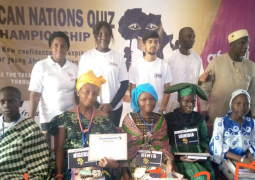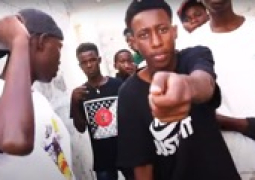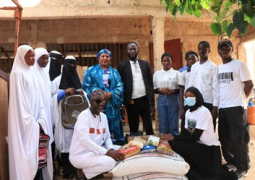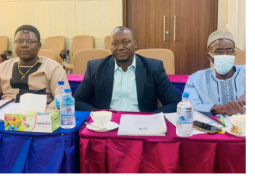BANJUL, 7 February 2024 – Today, Ms Fatoumatta Keita, a young girl from the St Johns School of The Deaf addressed the UNICEF Executive Board Member States to speak on Disability Inclusion. Ms Keita’s speech highlighted the plight of children with disabilities, especially those living in Africa, and urged the world to ensure their needs are always considered and supported to realise their rights.
Fatoumatta’s intervention as a panelist speaking on behalf of children, and adolescents, with disabilities is momentous and significantly amplifies their needs and voices amongst decision makers and to the world at large. Fatoumatta’s participation is in support of the Government of The Gambia and UNICEF’s presentation of its Country Programme Document (CPD) 2024 – 2028 to the UNICEF Executive Board for consideration. The CPD 2024 – 2028 is derived from the United Nations Sustainable Development Cooperation Framework (UNSDCF) 2024 – 2028, which is the UN’s contribution to the National Development Plan 2023 – 2027. An excerpt of her speech is enclosed below.
Following UNICEF’s Executive Board’s approval of the CPD 2024-2028, UNICEF Representative to The Gambia, Nafisa Binte Shafique, stated; “Today we celebrate the Executive Board’s endorsement of our new CPD. In partnership with the Government of The Gambia, the CPD outlines UNICEF’s commitment to delivering for every child in The Gambia over the next 5 years. I wish to extend my sincere gratitude to Fatoumatta Keita for her powerful address to the Executive Board. Over the next 5 years, UNICEF Gambia will increase our work with inspirational young girls, like Fatoumatta, as well as adolescents across the country to ensure their meaningful participation in programmes and policies that affect their lives. Together, we will continue to uphold, promote, and protect the rights of all children and adolescents in The Gambia to achieve their full potential.”
Statement by Fatoumatta Keita at the UNICEF Executive Board session
“Growing up, the idea that I could make it this far in life was not only unlikely, it was impossible. I was born deaf and lost my father when I was three years old and my mother when I was 10. For most children like me that is the end of their story. They are often cast aside in the shadows of statistics and terminologies. I am lucky. Unfortunately, I am amongst the very few who can say that in this part of the world.
Today, I want you to see, through me, the incredible potential of children with disabilities, like all children, to inspire hope and change when they are treated with dignity and allowed to dream and pursue their dreams. I want you to imagine the possibilities of a world where every child is seen, heard and included – not as indicators of diversity and inclusion, but as humans with rights, dreams, and potential.
Across Africa, children with disabilities face multiple and overlapping challenges. For most children with disabilities, the basic services simply don’t exist or are limited to cover their needs. Our society is restrictive to children like me.
We refuse to be held back. With determination, I have found my voice and, today, I am not only an advocate for girls with disabilities but for all vulnerable and excluded children, including girls who face violence and abuse.
My dream is to be a nurse to help others, but I am aware of the challenges ahead – how I will interact with my patients, share a joke, or counsel them.
Now, if you are wondering what you can do for us, it is simple. Just deliver on the promises you made in the international conventions and treaties.
Ms Keita calls the need to ensure that children with disabilities are seen and counted to include our needs in policies and programmes. We also want to be included in decision-making on all policies and programmes meant for us; invest more in the development of children with disabilities. Mobilize all partners, including communities, civil society, and the private sector, to create equal opportunities for us to learn, develop and pursue a career; take urgent action to protect children with disabilities from sexual violence and abuse. We are hardly listened to even when we break all the beautiful records. Often, we live in a cycle of violence in silence; please don’t leave any child behind as you innovate and adopt new technologies such as AI.
“Work with us to use the power of technology to solve some of our problems and ensure that we are included. We are not outsiders. We are a part of humanity worthy of rights and dignity.”





